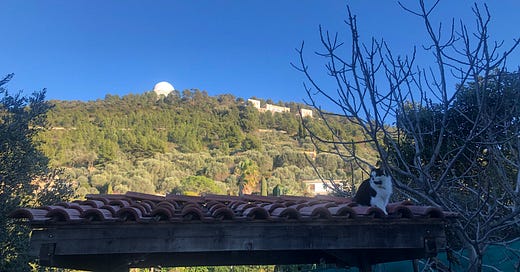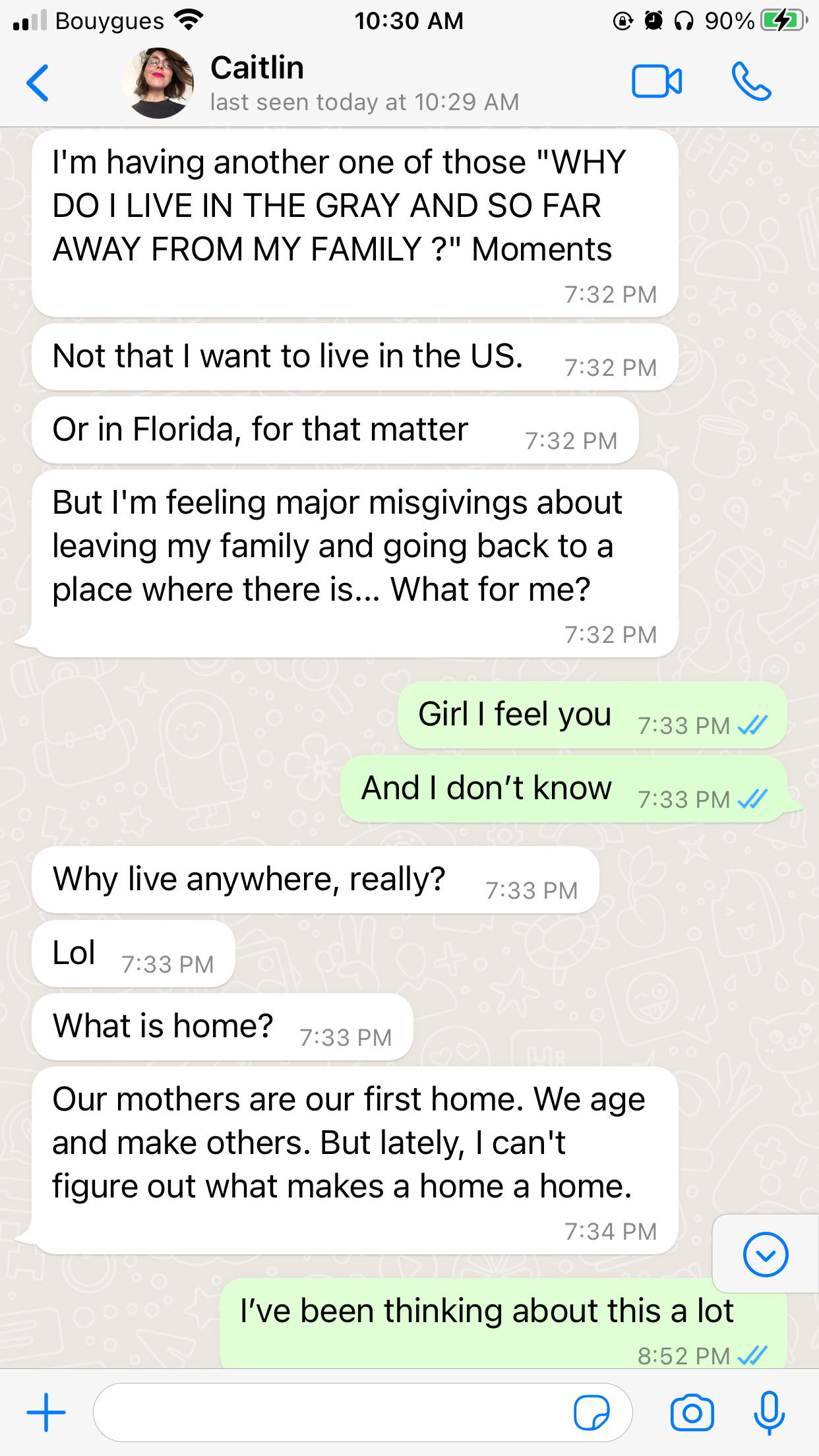Hi friends!
It’s now Day 10 of my COVIDlescence, and let me tell you: I am ready. To get. OUT.
My God this has been a long 10 days. I feel almost completely fine now, and any lingering symptoms feel more like bad allergies, plus the famous fatigue.
As we all seem to be getting Omicron, it may be helpful for me to share a roll call of my symptoms—forwarned is forearmed (unless you’ve already been boostered, in which case forewarned is sore-armed, heheh).
D-Minus 3 (Exposure): I believe I was infected while I was traveling to visit my brother and his family, which was three days before my symptoms.
Day 1: Felt a little off; runny nose, headache, a bit run-down.
Day 2: Scratchy throat, bodily discomfort, really tired. Was traveling, just wanted to get home and get to bed. Feverish, dizzy, and bodyache-y by evening. It was a lame New Year’s Eve.
Day 3: TKO. Bodyache, fever, dizziness, exhaustion, upset stomach. Couldn’t get out of bed all day.
Day 4: A little better, but slept all day again.
Day 5: Less bodyache, more cold symptoms and headache. PCR-tested positive for COVID (but negative for flu, because apparently “flurona” is a thing now).
Day 6: Cold symptoms plus upset stomach again.
Days 7-10: Mild cold symptoms and fatigue; just feels like allergies. Exercise is exhausting, my lungs hurt and heart starts hammering at mildly strenuous activity.
On infectiousness, I’m completely stumped. Between when I likely caught it and when I started showing symptoms, I had close contact with eight people; none of them tested positive subsequently. After I came home sick, I infected Wieland, who also showed symptoms after two or three days.
I just took a self-test and HALLELUJAH it is negative!!
I want to finish writing this but just imagine me over here like Karamo:
I’ve had a lot of time (okay 10 days, but a very concentrated 10 days) to think about where I am, and where the people I love are (not here). On New Year’s Eve, as I was leaving my brother and his family, my friend Caitlin was also leaving her family; she sent me this message:
Family is an ambiguous concept for me, a third-culture kid whose family—and pretty much everyone I’ve ever known—lives in various far-flung locations around the world. As an adult, the people in my close circle are like me: from somewhere, but now somewhere else. We have to make our families where we are, and we usually remain family even once we’ve moved on to the next place.
Looking through my Whatsapp from the holidays, my chats were with friends from Argentina, Wales, Sweden, US, India, El Salvador, Taiwan, Lebanon, Mexico, Germany, Japan, Italy, and UAE—although most of those people were not in those places, but somewhere else entirely. One text, from my dear friend Songya, particularly nailed our culturally disparate-yet-unified experience: “Happy holidays from our Taiwanese-Australian-Mexican-American family to yours, Meera!”—my family being Indian-British-Japanese(kinda-sorta)-French-Italian.
Although we can adapt to pretty much any place, the folly of an identity that isn’t rooted in any one place is that we have a tendency to think we can go anywhere and be fine. I don’t know how many times I’ve struggled under this misapprehension—always too late, after I’ve already moved, I realise I don’t know anyone there, and remember that close friendships take years to establish. I last did this one month ago; the time before that, four-and-a-half years ago when I moved to Berlin.
My first six months in Berlin, I tried to meet people through work or mutual, far-flung friends (a friend in London who used to work in Shanghai might introduce me to an ex-colleague who just moved to Berlin)—they are mostly other people like me, going through the motions to make their home where they are right now, for now; who knows, maybe this is the place they end up staying.
Even if the people you meet at first aren’t the people you stay friends with, you still have to do the dance; my closest friends tend to end up being people I met through someone I initially hung out with, but don’t see anymore. One of my best friends in Berlin is a girl I met through an American guy I briefly dated after meeting him in Switzerland; that relationship ended, but the friends he introduced me to became my Berlin family (although they’ve since moved to Lisbon). I affectionately call her my wife, and we both jokingly call her husband “Mom” (he’s very strict).
My first six months in Berlin were excruciatingly lonely—and it was my first Berlin winter, which is brutal at the best of times (though now, recalling it through a locked-down lens, it was objectively not so bad). I got way too involved with a guy who was evasive as to just how split up he was with his girlfriend back in the US (it turned out, not at all; I believe they’re now married); back then, I was so afraid of being alone that I’d rather resort to maybe being someone’s side chick than feeling lonely.
On one of the days that he was pushing me away in between inviting me to hook up, I ventured alone to a Christmas market and ran into colleagues who were there with friends; they can’t have known how lonely I was, or how much I wished they’d ask me to join them (they didn’t). I sat on a step, surrounded by festive cheer but with no one to share it with, and sent my best friend Heather, the only person I spoke to every day, one of many daily voice notes. Heather, who had recently moved to San Francisco (having previously lived in London, Tokyo, and New York), got me through that solitary winter in Berlin solely via daily voice notes.
Over the past four and a half years since, I’ve grown a family in Berlin, of people like me who are far from theirs. We also share similar experiences of moving abroad. By and large, we all left something painful behind and took a risk to start over on our own; none of us were rich kids whose families bankrolled overseas educations and upscale apartments; we’re familiar with getting into debt, and getting ourselves out of debt; we’ve known what it is to be broke, down and out, lonely, and scared in an unfamiliar country (try having your lights turned off in the dead of winter and navigating that in German); and we’ve all built something of our own from the ground up, from scratch, in a hitherto foreign place that we gradually made our homes.
As I’ve entered my late thirties and have experienced more Big Life Stuff on a more frequent basis, friend-family dynamics have become more complicated. It used to be as simple as finding people I liked where I happened to be—lately, though, value-alignment has become a non-negotiable factor. That’s been a consequence of grief, which Katie Kitamura describes in A Separation, a book I read over the holidays:
When you are young, you do not have an intimate experience of death, of loss, you do not have enough sadness in you to mourn. You need to have a great deal of sadness inside you in order to mourn for other people, and not only yourself.
In the past couple of years, my closest friend circle has become people who share a capacity for mourning for others, not only for themselves. It’s a strange development I didn’t expect, but it’s been an increasingly necessary and organic process, particularly for those of us who have family—including elderly parents—on the other side of the world whom we can’t visit. There is so much to mourn, daily, even simply lost time with loved ones. Being each other’s family is more important than ever.
It’s rare to find a book that speaks to my experience of cultural displacement, which is why I enjoy Katie Kitamura’s writing so much. A Separation reveals very little about the narrator, not even her name—so it’s significant that, right at the beginning, she is established as a foreigner:
[Her mother-in-law] pronounced the word foreign with a familiar blend of suspicion, mystification (she could not imagine any reason why her only son would wish to remove himself from her vicinity) and pique. The words returned to me then, phrases spoken over the course of the marriage: you’re foreign, you’ve always been a little foreign, she’s very nice but different to us, we don’t feel as if we know you (and then, finally, what she would surely say if Christopher told her that it was over between us), it’s for the best, darling, in the end she was never really one of us.
I know first-hand how this feels, and I think I may have gasped a little when I read it. This revelation about the character set the tone of the rest of the book for me; in every situation and interaction, I imagined the role of her foreignness in influencing how she behaved, and how she was perceived. The suspenseful moments of the story were even more heightened in knowing that she was an outsider, and therefore more vulnerable.
A hallmark of the character is her profound aversion to emotionality and systematic invalidation of her own feelings, even in bereavement: “I did not believe my grief had any claims to make of its own.” She is appalled by the idea of subjecting anyone to her feelings, of putting them in the uncomfortable position of witnessing or managing them.
This felt deeply, culturally familiar, assuming the character was, like the author, Japanese-American; being raised between Japanese and Indian cultures, I did not grow up learning to give precedence to my own feelings. The theme persisted into my adulthood in Europe, as a foreign person in most rooms, where I have felt obliged not to take up space or make other people aware that I have feelings, needs, and opinions that might conflict with theirs.
It speaks to something I’ve deeply internalised in relationships, jobs, even friendships: that I should never make someone else uncomfortable with the volume of my feelings. I’ve become accustomed to keeping myself small, because I’ve been made to understand that when I emote, my default setting is bigger, louder, and more alarming than people are comfortable with. This is true of me both as a woman of colour and a neurodivergent person who experiences things with extreme intensity.
I have an excess of loud feelings that are sometimes deafening; more often than not, I’m around people who are not used to women with loud feelings. When I begin to emote, their standard response is to:
a) try and fix it, or
b) take it personally.
This happens so often in everyday life—work, and my environment in general—that it’s become completely intolerable in my personal life. I find that men most struggle to witness my big, loud feelings and give them space without trying to get involved. My women friends, on the other hand, are also women with big, loud feelings; when we observe our feelings getting the better of one another from time to time, we respond in one of two ways:
How can I support you?
Do you need some space?
It is so goddamn refreshing.
I realised this summer how deeply entrenched this behaviour—of modulating my emotional responses for the benefit of others—has become. After a major event that left me traumatised and with many overwhelming and inconvenient logistics to manage, I left Germany for a short break in France and Italy; within an hour of arriving in the Mediterranean, my pent-up emotions evidently sensed that we were in an environment where it was safe to emote openly. I found myself suddenly possessed by an overwhelming urge to start screaming—I was surprised by the extremity of feelings that I’d been unaware of until that moment.
(I did not begin screaming out loud… but I did grab my journal and scrawl AAAAAAAAAAAAHHHHH til I felt better. Surprisingly cathartic. Also a little sad.)
I read many reviews of A Separation (a little habit I have following something I’ve really enjoyed, because I like to extend my consumption of it) and was surprised that not everybody seemed to pick up on the same undertones of the character’s experience.
This review attributed the character’s inner restrictions to being a woman—also accurate, but absent of racial/cultural nuances: “If the too much woman is a cliché of femininity, so is the affectless, Botoxed one, and that is what its narrator increasingly comes to resemble: a woman who seals herself into a posture of bleak, chic passivity to avoid the risk of pain, of humiliation, of disappointment.”
While this review did note “she can’t work out how much feeling she is allowed [except] when emotion is being expressed at a performative distance”, the reviewer reduced an intimate portrait of being Other to “a smart study of upper-class alienation”.
I’m used to people not getting it; I’ve understood for a long time that I’m responsible for regulating my settings to accommodate my environment, and that any interpretation of my experiences falls under a frame of reference that is not mine. But that’s why my personal life reflects my inner life: friends who understand the experience of never really fitting in, with whom all of us are as Other as another, one another being the only sense of belonging we can find where we are. We get it, even if no one else does, and that’s part of what makes us family.
Things that helped this week
Vitamins C & D and zinc
This is the cocktail my friend Leslie, who also recently recovered from COVID, told me to take when I got sick. I guess it’s working, because my recovery has been pretty swift.
Accidental sobriety
Speaking of cocktails, I unintentionally started 2022 with a detox (if you can call plague-induced sobriety a detox), which was quite welcome, actually. As I’ve talked about before, I spent much of last year reevaluating my relationship with alcohol and trying to recondition my habits. I read this Guardian article by my friend Jamie, about her journey to sobriety and subsequent weight loss; more than her physical transformation, I find her commitment to change the most awe-inspiring.
Then I read this New York Magazine article about Tempest, a woman-founded alternative to AA. Holly Whitaker, the founder (and author of best-seller Quit Like A Woman), suggests that alcohol dependency falls on a spectrum, and thinks a recovery culture that forces anyone who seeks help to identify as an alcoholic is unnecessarily stigmatising.
She says:
The first step of AA is to admit powerlessness… “To a woman or any other oppressed group, being told to renounce power, voice, authority, and desire is just more of the same shit… It’s what made us sick in the first place.”
Doesn’t this make so much sense? Unlike AA, Tempest is a program for anyone from people who want to quit drinking entirely, to those like me who are more “sober curious”, and maybe just want to develop a healthier relationship with alcohol. I took their quiz, and I’m still considering the membership.
Freedom vs. Intimacy
…and How To Have Both, which is the title of this episode of Deeper Dating. In relationships, one of my biggest challenges has always been that I need a lot of space, which always makes me ask myself what is wrong with me and/or the relationship. If you struggle with this too, you might find this episode as reassuring as I did.
TL;DL(isten): Uncle Ken (Page, the host and relationship therapist) says some of us need more space than others and it’s extremely important that we make room for that in our relationships.
Queer Eye
I binged the latest season and, truly, there is no purer or more heartwarming TV. The only show that makes me feel good and cry on demand like QE is This Is Us, which aired its new season last week but for some reason is not on Prime Video yet 😤
A great weekend bag
Instagram served me an ad for this bag months ago, and I finally bit. Believing the hype and buying from a celebrity-owned brand always feels like a risk, but I love this bag. It’s so practical, the perfect size for travel, and looks beautiful. 10/10
A reality check
My friend Heather sent me this HBR article about the risks of not choosing a partner who supports your career—a great, if uncomfortable, read. I especially liked how it compared spousal relationships to gendered workplace dynamics:
“I didn’t know,” many of the men I interviewed told me after their wives left. To me, this sounds a lot like what corporate leaders tell me after their most senior female executives quit. They hadn’t expected them to leave, hadn’t quite understood how upset they were by the attitudes, the lack of recognition, or the promotion of the less competent man down the hall.
No lies detected here.
Artichokes and oysters
I only just got into both, which means I’m also now completely obsessed with both (and will remain so until I get completely sick of them).
I never understood what we’re supposed to do with artichokes but since I learned, I can’t stop eating them. I follow this steaming method and dip the leaves in a thick, sweet, homemade vinaigrette. Heaven.
For a long time, I couldn’t get past the thought of oysters as giant boogers and also wasn’t sure how ethical they were. It turns out, much more than you’d think: not only are they non-sentient beings barely distinguishable from plants, but oyster farming is one of the most sustainable methods (far more so than agriculture) and is actually good for the environment.
Cats that helped this week
Olive has been spending most of her time inside, and looks kinda depressed; as my more intrepid cat of the two, her behaviour is curious and concerning.
Mr Munch, on the other hand, is an erstwhile-scaredy cat living his best life. The sky’s the limit for this one, suddenly.
A portrait in repose: I feel like this really captures their essence.
My landlord just informed me that he’s just bought two chickens to keep in the garden, so now I have to worry about keeping my children from being murderers. I fear the little bells on their collars will do very little to protect the poor chickens. Who will supervise us? Please send help.
Tomorrow is my first day back in the wild—but it’s also my first day back at work, because of course. Still, I am determined to leave my studio at long last so I will probably traipse down the mountain to find a coworking space or a terrace with wifi—even a coffee out of isolation is a freeing concept.
Have a great week, folks!





















Share this post